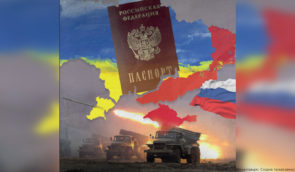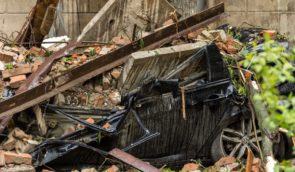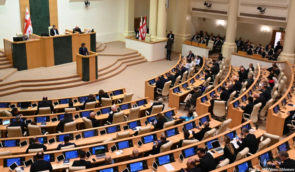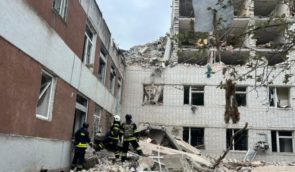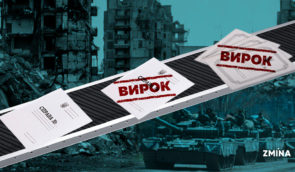Levels of Xenophobia not Increasing, but Tensions are Growing
Normal
0
false
false
false
RU
X-NONE
X-NONE
/* Style Definitions */
table.MsoNormalTable
{mso-style-name:”Обычная таблица”;
mso-tstyle-rowband-size:0;
mso-tstyle-colband-size:0;
mso-style-noshow:yes;
mso-style-priority:99;
mso-style-qformat:yes;
mso-style-parent:””;
mso-padding-alt:0cm 5.4pt 0cm 5.4pt;
mso-para-margin-top:0cm;
mso-para-margin-right:0cm;
mso-para-margin-bottom:10.0pt;
mso-para-margin-left:0cm;
line-height:115%;
mso-pagination:widow-orphan;
font-size:11.0pt;
font-family:”Calibri”,”sans-serif”;
mso-ascii-font-family:Calibri;
mso-ascii-theme-font:minor-latin;
mso-fareast-font-family:”Times New Roman”;
mso-fareast-theme-font:minor-fareast;
mso-hansi-font-family:Calibri;
mso-hansi-theme-font:minor-latin;}
Since the time of the Maidan protests, the level of xenophobia in Ukraine has not increased significantly. However, at the same time, experts note use of vandalism for propaganda purposes by the Russian invaders.
Recently, the annual report on xenophobia in Ukraine by the Minority Rights Monitoring Group of the Congress of Ethnic Communities of Ukraine was presented in Kyiv. This was followed by a discussion panel called “Xenophobia in Ukraine after the revolution and the Russian intervention.”
Experts have examined how Maidan united various ethnic and national groups, whether there was interfaith reconciliation during the Revolution of Dignity of 2014, and how the annexation of Crimea and the subsequent occupation of Donetsk and Luhansk regions affected the situation of national minorities.
“Taking into account these studies, we can say that Ukrainians have defended their independence and Crimean Tatars and Jews have helped them,” said the executive vice president of the Congress of Ethnic Communities of Ukraine, Iosif Zissels, commenting on the reduction in the social distance between different ethnic groups in Ukraine.
At the same time, Zissels noted that the level of social distance has increased in relation to the Russians. He also commented that, despite the all-out propaganda attack from Russia saying that Ukraine is ruled by fascists and that anti-Semitism is flourishing, Ukraine is surviving these attacks: “I would not agree with the position that Ukraine is losing the propaganda war. Few people in the world believe that level of anti-Semitism has increased in Ukraine.”
The Head of the Minority Rights Monitoring Group, Vyacheslav Likhachev, noted that the outbreak of war in Ukraine brought with it a public legitimization of symbolic violence. It is dangerous that a significant part of the society approves of, for example, acts of hooliganism in front of the Russian Embassy, the demolition of Lenin monuments, etc.
Meanwhile, it is obvious, notes Likhachev, that some of the anti-Semitic incidents were undertaken with the purpose of provocation and to serve the needs of Russian propaganda. This happened first in the context of confrontation between former President Yanukovych and Maidan protesters, then later to legitimize Russian aggression.
According to the monitoring data, the use of anti-Semitism in public rhetoric has reached the largest scale in the territory occupied by Russia in the Donetsk and Luhansk regions
Maksim Butkevich, Coordinator of the No Borders Project of the Center for Social Action and the Resource Center of Assistance to Internally Displaced Persons, also notes the general radicalization of society.
Among the biggest concerns are what he calls the “normalization” of violence and the acceptability of extreme right-wing ideology, because those right-wingers are now taking up arms for the territorial integrity of Ukraine.
“It is no secret that the longer the war lasts, the more difficult it will be to hold on to a perception of the world without it becoming more and more black and white. This complexity and diversity that was achieved during Maidan may be rolled back during war. It is a situation which physically divides the front line into the camps of “them” and “us,” those who are generally good, and those generally bad. This is natural, but it leads to the unfortunate idea that if the person takes up arms to defend Ukraine, then their ideology necessarily deserves respect.
At the same time, the people who are fighting on the front hold very different ideas. Starting from the lefties, whom I know personally, fighters for liberal thought and belief, to the right-wingers with radical, chauvinistic, xenophobic, racist, and neo-Nazi views,” says Butkevitch.
Among other things, Butkevitch names rising social tensions in the communities that are hosting the internally displaced, while the government is unable to develop and implement a long-term integration program for them.
“There is a growing social tension between the internally displaced and host communities, and the state either does not see or does not want to see. So, after a year of the war, what it has done for IDPs has been ‘too little, too late,’” said Butkevitch.
According to experts, in contrast to the Orange Revolution in 2004, where Ukrainians identified themselves as an ethnic nation, Maidan in 2013 showed Ukrainians as a political nation, inclusive of language spoken, ethnicity, or place of residence.





